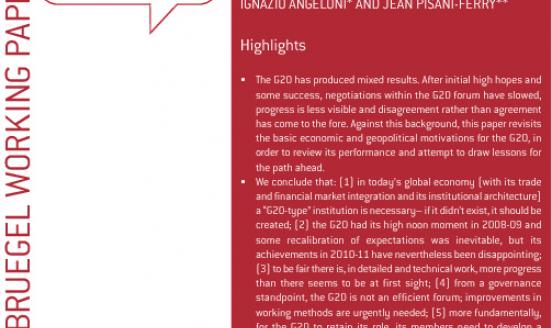Some light in the fog
The good news is that the G20 summit seems to have been more forceful in addressing the impending risks to the international economy than last minute expectations implied. A dubitative form is necessary, however, because the signs from Los Cabos are uncertain and partly contradictory and also because a lot will depend on follow-ups.
The central message in the final statement, “Euro Area members of the G20 will take all necessary policy measures to safeguard the integrity and stability of the area” would in itself be quite significant if it could be taken literally. Good part of the summit and a host of meetings and contacts on the side were centred on Europe’s contingencies and how to deal with them. One thing is certain: the euro area leaders attending the meeting (5 in number, plus Spain as guest) were under the spotlight with greater intensity than they anticipated, as revealed indirectly by Manuel Barroso, the Commission President, in a press conference: “we are not here to receive lessons [on] how to handle the economy”.
The Los Cabos meetings were useful also in clarifying further the elements of the European diplomatic puzzle. They can be summarised as follows:
1. Negotiations are slower than one would hope because each side uses delay tactics to obtain maximum concessions from the others;
2. The two main players, Germany and France, differ in that the second can accept further EU federalism only if it (first) sees effective crisis resolution instruments in place, while the first is prepared to accept the latter only after having secured the former;
3. While this conundrum would lend itself to a very natural solution (do both at the same time, and quickly!) it also risks generating dangerous “chicken games”, whose unintended casualty may end up being Europe’s monetary and financial stability.
Recent developments clearly suggest that, at the point we are, the simple announcement of roadmaps however credible would not stabilise markets on a durable basis. Hence the need for a multiple package including both elements mentioned under point 2. Reportedly, discussions started in Mexico, and are likely to continue in Rome (where EU leaders will meet on Friday) and Brussels (at the 28-29 June European Council), on the possibility of using interventions by the EU rescue funds to backstop sovereign yield spreads for countries still on the market but under stress, subject to conditionality. If successful, this hypothetical strategy would reduce the risk of self-fulfilling runs on sovereign debt markets, which in present conditions would inevitably be accompanied by runs on the banks. If concrete, these discussions can become a useful element in a crisis management strategy.
On another issue, a useful deliverable of the summit was the completion of the IMF resources increase, announced in April but yet to be clarified in several respects. As detailed by the IMF, after Los Cabos the commitments sum up to more than 450 US dollars, with several countries adding in their commitment at the summit, notably the 5 BRICS (for a total of 75 mln US$).
Otherwise, the remaining 8.000-some words of the Los Cabos summit final communiqué add little value:
· The leaders have launched a “Los Cabos Growth and Jobs Action Plan”, whose content, however, is entirely made up of measures already decided or adopted before the meeting.
· On financial regulation, the decisive stance of the London 2009 declaration is completely gone; in spite of the long sequence of “welcoming” and “encouraging” statements, referred to actions undertaken or planned by regulators and standard setters, the reality is that the process has been entirely delegated by the G20 and no more guidance or stimulus from it is coming. This is worrisome, because, as we see on both sides of the Atlantic, resistance to change is very strong and without political involvement little is likely to be achieved.
